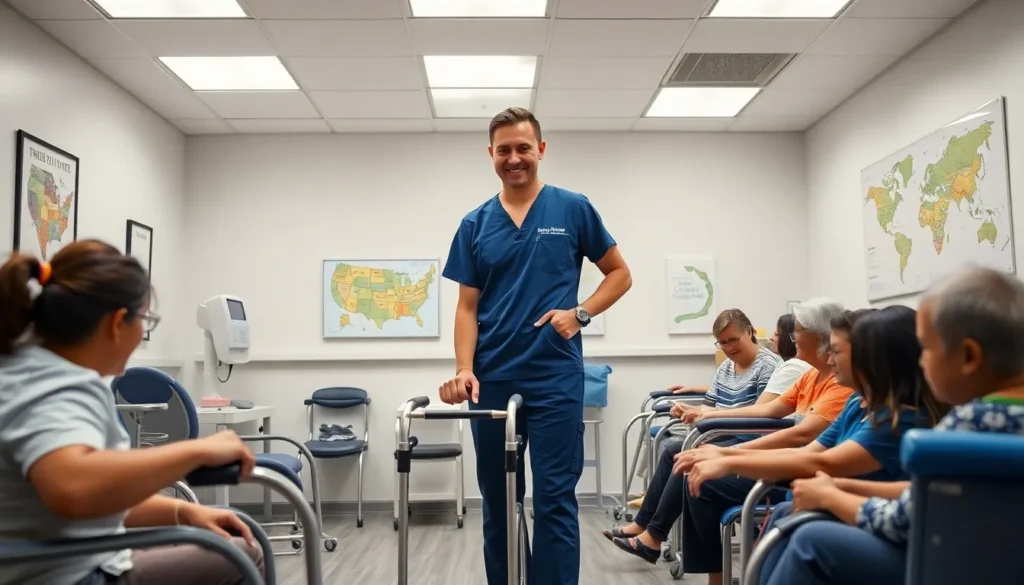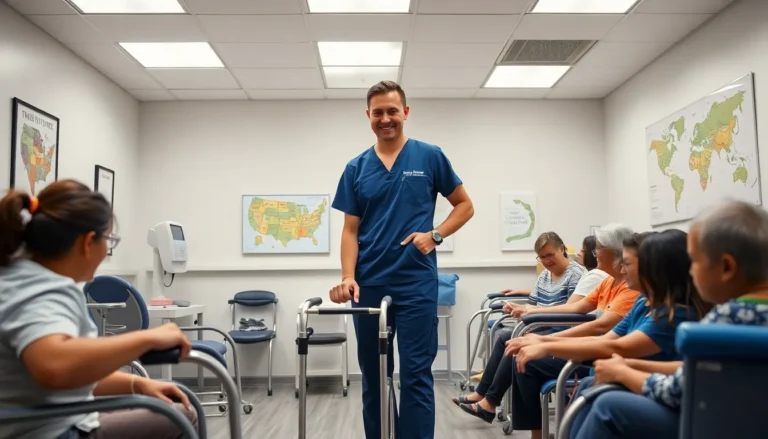Table of Contents
ToggleIf you’re tired of the same four walls and dream of exploring new cities while making a meaningful impact, then travel COTA jobs might just be the golden ticket you’re looking for. Picture this: waking up in a cozy hotel room in a bustling metropolis one week, and a serene countryside cottage the next, all while helping patients regain their mobility and independence. Sounds enticing, right? Let’s jump into the world of travel COTA jobs, where adventure meets professional growth and rewards await those willing to take the plunge.
What Is a COTA?

A COTA, or Certified Occupational Therapy Assistant, plays a pivotal role in the healthcare industry. These professionals work under the supervision of licensed occupational therapists, helping patients develop, recover, and improve the skills needed for daily living and working.
COTAs engage in hands-on therapeutic and rehabilitative exercises tailored to each individual’s needs. Think of them as the supportive backbone of rehabilitation, guiding patients through every step of their journey. In essence, they blend compassion with expertise to enhance the quality of life for a diverse range of patients, from children to the elderly.
The Benefits of Travel COTA Jobs
Travel COTA jobs come packed with benefits that can make anyone eager for adventure. First off, let’s talk about the experience. Traveling as a COTA allows individuals to work in different healthcare settings, gaining invaluable insights and skills along the way.
Another perk? The pay. Travel COTAs often earn higher salaries than their stationary counterparts, primarily due to the demand for flexible professionals in various locations. Plus, they typically receive stipends for housing and travel, who wouldn’t want to have their expenses covered while exploring a new city?
Not to mention, there are often opportunities for networking and building connections within the occupational therapy community across the country. Every state has its own quirks, challenges, and patient needs, making each assignment a unique adventure.
How to Become a Travel COTA
So, how does one embark on the exciting journey to become a travel COTA? The first step is quite straightforward: you must earn an associate degree in occupational therapy assisting from an accredited program. This education typically includes both classroom instruction and hands-on clinical experiences, paving the way for a solid foundation in the field.
After completing the education requirements, prospective COTAs must pass the NBCOT certification exam to earn their credential. This is followed by obtaining state licensure where they intend to work. Each state has its unique requirements, so it’s crucial to research accordingly.
Once certified and licensed, aspiring travel COTAs then need to gain some experience in the field, typically, at least one year of clinical practice. With experience under your belt, the next step is to partner with a reputable travel staffing agency that specializes in healthcare placements. They’ll help guide the way in finding suitable assignments that align with personal preferences, skill sets, and desired locations.
Finding Travel COTA Positions
After taking the plunge and gaining your certifications, the real fun begins: job hunting. First, start by leveraging online job boards that focus specifically on travel healthcare positions. Websites dedicated to healthcare staffing are teeming with opportunities ranging from local assignments to those in distant states.
It’s also wise to connect with recruiting agencies that specialize in travel COTA jobs. These organizations work diligently to match COTAs with facilities in desperate need of their services, often providing support in securing accommodations and navigating the onboarding process. Networking within professional organizations and attending workshops can also lead to hidden job prospects that are not publicly advertised. Don’t underestimate the power of social media: platforms like LinkedIn can be goldmines for opportunities and making connections in the field.
Essential Skills for Travel COTAs
Travel COTAs need a distinct set of skills that go beyond their clinical expertise. Flexibility is paramount since each assignment may present unique challenges, varying treatment protocols, and unexpected patient needs. Strong communication skills help COTAs work effectively with different teams and patients from diverse backgrounds.
Also, adaptability is crucial: being able to quickly adjust to new environments and treatment regimens is vital for success. Time management skills also come into play. Managing patient loads while maintaining the quality of care can be a juggling act, especially in fast-paced settings. Finally, cultural competency enhances interactions with patients, ensuring respect for their individual backgrounds and experiences.
Challenges of Travel COTA Work
Of course, every silver lining has a cloud. Travel COTA positions, while thrilling, come with their own set of challenges. Frequent relocation can lead to feelings of instability or loneliness, especially when moving to cities far from friends and family.
Adjusting to various facility protocols and staff dynamics can also be a hurdle. Each assignment has its own culture, which might take some time to adapt to. Another reality is that not every contract will be ideal. There might be longer hours or a heavier patient load than expected. To navigate these challenges, it’s crucial for COTAs to cultivate resilience and maintain an open line of communication with their supervisors and recruitment agencies.








